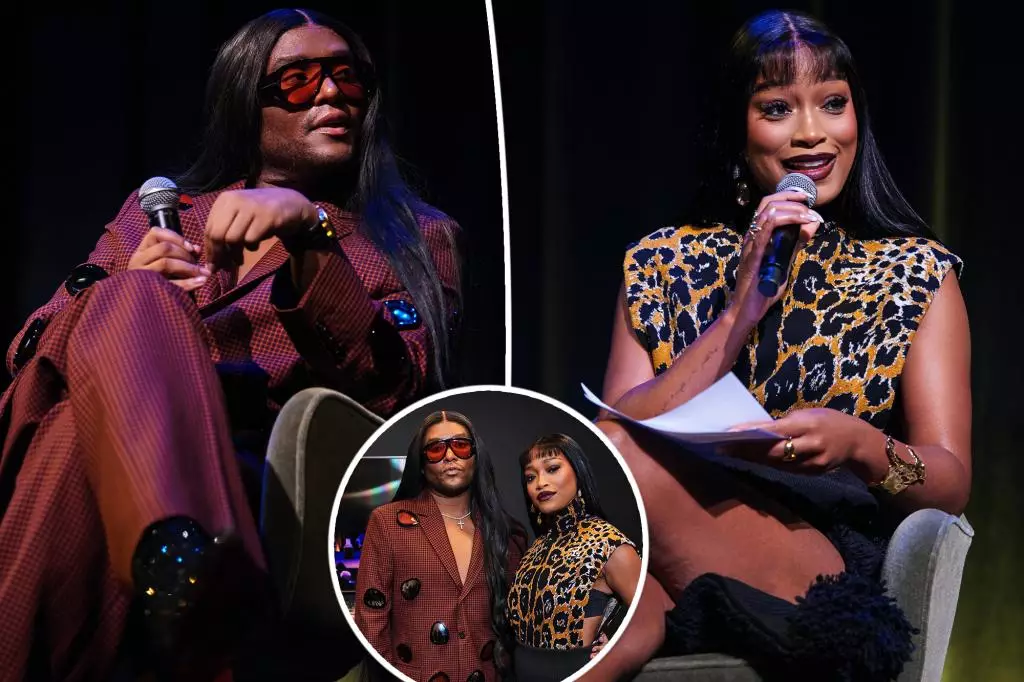Keke Palmer, a multi-talented actress and activist, and Law Roach, a celebrated stylist and self-proclaimed “Image Architect,” have cultivated a unique professional relationship that bridges the gap between fashion creativity and personal expression. Despite the occasional creative differences that arise, the underlying respect and admiration between them remain evident. Their recent panel discussion, centered around Roach’s new book, “How to Build a Fashion Icon: Notes on Confidence from the World’s Only Image Architect,” provided a fascinating glimpse into their collaboration experiences.
During the discussion, Roach humorously recounted a past interaction where Palmer candidly expressed her reservations about his styling choices, saying, “You might be the best stylist in the world, but you’re not the best stylist for me.” Such straightforwardness showcases Palmer’s commitment to authenticity and personal comfort, which in many ways, mirrors the challenges many women face in the fashion industry. Their dynamic serves as a poignant reminder that collaboration in the art of style isn’t always smooth, but it is crucial for ensuring that the individual being styled feels genuine and empowered.
Palmer’s journey through motherhood has compellingly tied into her evolution as a fashion icon. After the birth of her son, Leodis, in February 2023, the actress began to redefine her understanding of body image and style. Speaking on her transformation, she explained that motherhood has bolstered her confidence. “After having my baby, I’ve just gotten so much more powerful,” she stated, underscoring how this new chapter in her life has amplified her self-assurance. This newfound strength allows her to embrace her curves, evolving her sense of style to reflect an honest representation of her self.
This transformation speaks volumes about the internal battles many women face regarding body image, especially in the public eye. In a world that often imposes rigid standards on how women should present themselves, Palmer’s candid reflections challenge those norms. Her recent experience of being shamed for her body while wearing a curve-hugging dress serves as a backdrop to her renewed commitment to self-love and acceptance, which resonates profoundly with many women navigating similar challenges.
Delving into her stylistic preferences, Palmer articulated a sense of continuity rather than a stark transformation linked to her recent life changes. She pondered whether her style had been altered by motherhood or if it was simply a return to her more authentic self. “I was always kind of a serious kid; I was just always so ready to go to an office,” she reflected, hinting at a deep-rooted ambition that layers her artistic and public persona.
Her storytelling reveals an ongoing quest for self-identity—a journey that embraces both tradition and innovation. Palmer’s evolution is not just about changing clothes or appearances; it’s about understanding her place within the sphere of fashion and how it intersects with her larger life narrative. This philosophical approach allows her to navigate the complexities of her career while remaining grounded in her personal values and aspirations.
The dialogue between Palmer and Roach epitomizes a broader conversation about empowerment in fashion. Their candid exchanges illustrate that fashion is not merely about aesthetics; it’s also about personal growth and self-expression. By encouraging open communication about their diverging stylistic visions, they highlight the importance of respecting individual preferences within collaborations.
As Palmer continues to evolve as an artist and as a mother, her influence extends beyond just her personal choices. She serves as an inspiration to others—encouraging women to embrace their bodies, voice their preferences, and ultimately, command their identities in a world that often attempts to dictate how they should look and feel. The lessons drawn from her journey with Roach encapsulate a powerful message: true style is authentically personal, shaped by the unique experiences and challenges that accompany individual growth.
Palmer and Roach’s relationship embodies the complexities of partnership in fashion, emphasizing the significance of personal empowerment, the fluid nature of identity, and the tenacity it takes to embrace one’s true self.

